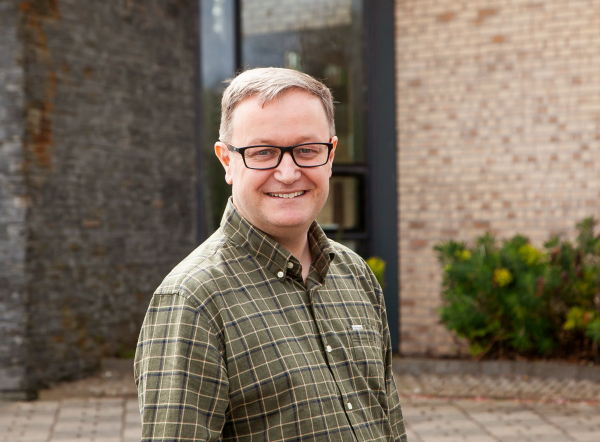
Philip Annett, 49 from Portadown, was in the middle of a short career break from his work, which often saw him travelling across the world to destinations including the Philippines and South Korea, when he had a sudden stroke on the 22nd of October 2022.
Philip recalls, “My 16-year-old son Ethan and I were down in Lisburn building a fence at my mother in law’s house. After lunch, I knew I didn’t feel well. I felt like I had a dizzy head, although it wasn’t a normal dizziness. I thought it would get better, but it didn’t go away.”
“Ethan was asking me, ‘Are you okay?’ but I couldn’t reply back to him because my speech had gone. Thankfully Ethan knew straight away it was a stroke and got me inside the house and phoned for an ambulance. He was told it would take 2 hours and it would be quicker to get me in a car if possible, so my wife Denise helped me into the car and drove to Craigavon.”
“They scanned me and found out I had a clot on my brain caused by a dissection in the left carotid artery. I received the clot busting drug Thrombolysis and was then blue lighted to the Royal where the team were waiting to bring me into surgery. There were several people in that team, nurses, and surgeons, who came in late on Saturday afternoon when they weren’t on duty. It’s amazing that those people, who didn’t know me, came in of their own free will to treat me. I had a Thrombectomy which saved my life.”
“As I was wheeled back towards the recovery ward, I put my thumbs up to my wife and was trying to speak to her which was amazing as just before the surgery I had no comprehension and couldn’t communicate at all. Now I was starting to speak and understand again.”
By Monday, Philip was walking around with physios and was discharged back to Craigavon Hospital. He started Speech Therapy and was classed as having moderate to severe aphasia and dysphasia. Aphasia is when a person has difficulty with their language or speech, and dysphasia means an impaired ability to understand or use the spoken word.
Philip says, “My mobility was okay at that stage, my speech was the main problem. I could say words when looking at a picture, like dog or cat. I also had to work on my writing and reading – even now, I would still struggle a bit with reading a book. I was then transferred to Loane House in Dungannon and received speech therapy around 3 or 4 times that week. When I was discharged the speech therapists continued to visit me at home. My speech got better then really quickly.”
“I would say the hardest part of my struggle was actually from there on. You would think everything was back to normal - my speech and mobility were okay - but I was out of routine, not working and I didn’t know what to do with myself. Anxiety played a big part and still does, although I’m getting a lot better. After you’ve had a stroke, when you have any little pain or twitch, you think, is this another stroke? It was the lack of confidence that really affected me.”
“The NICHS PREP programme really helped. When I first went, I was like a rabbit in the headlights. I was thinking, if I do too much will I have another stroke? Having that reassurance from Zoe and Rita from NICHS was the key thing. They gave you that gentle push along, or the tough love with a smile on their face, when you needed it.”
“It gave you a reason to get out of bed in the morning. You were meeting people who have been through the same thing and are in the same boat. The follow up on a personal level was so important – to have people that were interested in you, in where you were at, the level of progress you were making, and where you could get to was so important. The NICHS team are bright, positive and willing to listen.”
Philip is now aiming to return to work. He does not want to let his stroke define him. He says, “My stroke is part of my story and always will be, but my story is not over. I don’t want to be identified as a ‘stroke survivor’ or someone to feel sorry for – I’m just Philip. Everybody goes through difficult things in their lives. It’s important to talk about it openly, but you have to try and build back what was normal too, the things that you enjoy, and then move forward.”
“It’s not the end, it’s the beginning of a life that might be slightly different, but it’s still a life that’s worth living.”
